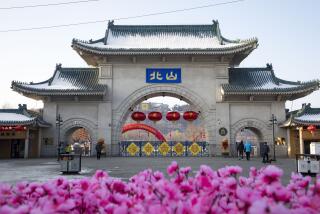China airs drug traffickers’ moments before execution
BEIJING -- It was reality television in the extreme.
Chinese state television Friday broadcast nearly one hour of live images of the last moments of four foreign drug traffickers about to be executed for the 2011 killing of 13 Chinese fishermen on the Mekong River. Although the cameras pulled away before the final lethal injection, the unprecedented pre-execution coverage unleashed a storm of criticism and debate about the death penalty.
Psychologists decried the live coverage as distressing to children, while lawyers complained that it violated a clause in the criminal code against parading the condemned before execution.
“This carnival on CCTV was a violation not only of ethics, but of the criminal code regulations that the death penalty not be carried out in public,” wrote human rights lawyer Liu Xiaoyuan on a microblog. Many on the microblogs, however, applauded the execution of the four drug traffickers.
China executes about 4,000 people each year, more than all other countries in the world combined, although the numbers and the crimes carrying the death penalty are gradually being reduced.
“I don’t know of any other country, not Iran, Afghanistan or North Korea, that has nationally broadcast in this way the last moments of an executed prisoner,” said Nicholas Bequelin, Hong Kong-based researcher for Human Rights Watch. “It is a step backward at a time we thought China was making progress with the death penalty.”
In the past, public executions were common in China, but nowadays, there is usually no more than a brief news report and video of the condemned before an execution.
Although many Chinese were shocked by the live coverage, they applauded the death sentences as just retribution for a particularly violent crime. The 13 Chinese fishermen were ambushed, then shot to death while tied up with rope, their bodies dumped in the river.
The outraged Chinese government considered a drone attack to kill the drug traffickers, but in the end launched an international manhunt that resulted in their capture and extradition from Laos.
The kingpin executed was Naw Kham, 44, a Burmese national who allegedly commanded a militia of 100 men in the Gold Triangle region. Two others executed Friday were from Laos and one was Thai.
The live coverage showed the men being taken from their prison cells in southwestern Yunnan Province with their hands trussed behind their backs with ropes. A doctor in a white coat prepared the lethal injections.
The television commentator went on at some length about how well the men had been treated in prison.
“From the appearance of these criminals, you can clearly tell our prison has carried out humanitarian spirit, these criminals clearly look healthier, whiter, with better skin complexion than when they were arrested,” the commentator said.
At one point, the television broadcast cut away to show a gala-style award ceremony complete with patriotic music and small children carrying bouquets for the investigators who had worked on capturing the drug traffickers.
Chinese television also broadcast a chilling interview with Naw Kham taped earlier this week in which he said, “I am afraid of death. I want to live. I don’t want to die. I have children. I am afraid.”
The Yunnan Province Public Security Bureau sent out a message at 2:55 p.m. Friday that Naw Kham and his accomplices were dead.
ALSO:
It’s official: Benedict becomes pope emeritus
Venezuelan opposition leader faces fresh charges
In Hong Kong, baby formula feeds discord with mainland Chinese
John Hannon and Nicole Liu of the Times’ Beijing bureau contributed to this report.
More to Read
Sign up for Essential California
The most important California stories and recommendations in your inbox every morning.
You may occasionally receive promotional content from the Los Angeles Times.










